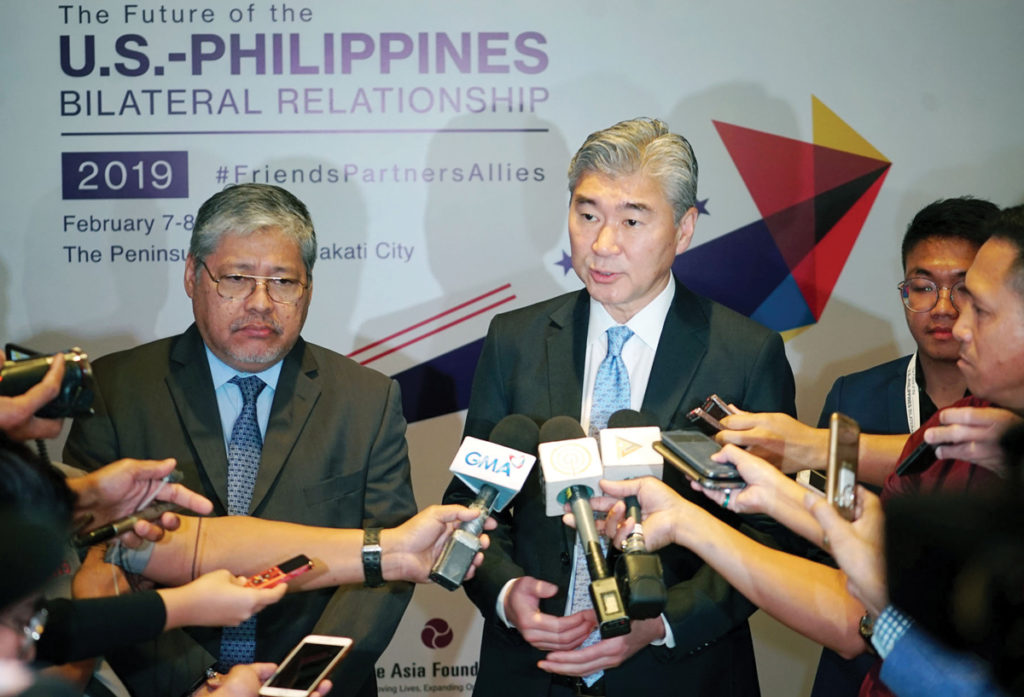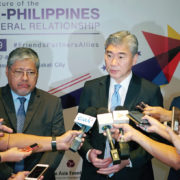
The United States government is open to any “useful” adjustments to the U.S.-Philippines 1951 Mutual Defense Treaty (MDT), U.S. Ambassador to the Philippines Sung Kim announced on Thursday, February 7.
The U.S. envoy told the reporters at a foreign policy forum in Makati that he supported the intentions of Department of National Defense (DND) Undersecretary Cardozo Luna to review the document due to its great importance.
“I think as (Defense) Undersecretary Luna made it very clear, any document, especially an agreement that important and that complicated, always needs to be looked at very closely as the circumstances surrounding the agreement or the alliance evolves,” Kim said as reported by The Manila Times.
The diplomat said that the two countries should not be entirely dependent on the strong ties they have agreed upon in the past.
However, Kim emphasized that the U.S. and the Philippines are facing global challenges that prompted the reassessment of such ties.
“Our alliance with the Philippines is our oldest in Asia. I have complete confidence in the strength, resiliency and importance of our bilateral relationship,” he said. “However, as we face new domestic, regional and global challenges, we cannot rest simply on our confidence in the strength of this long-standing relationship.”
The defense undersecretary stated that the 67-year-old treaty served as the basis of the security alliance between Washington and Manila. However, he said that the review from both parties is a necessity to ensure that the agreement is not outdated.
“The MDT has been the basis of our alliance in our continuing joint defense capability programs. However, as with all other defense agreements, reviewing agreements is a normal course of action, especially since the MDT has been enforced for over 60 years,” Luna said as reported by Business World.
The U.S. Ambassador relayed that the two countries “already have a very close dialogue at various levels.” He stated that they “would welcome taking a close look at the treaty to see whether we can make any adjustments to make it even better than what it is now.”
“So, I think we will just continue to stay closely engaged and talk to each other and if there are any adjustments that would be useful, certainly we would welcome an opportunity to make adjustments,” Kim said.
“We need to examine and analyze what lies over the horizon to ensure that we bring to bear the most effective tools and resources to not just overcome those challenges but to seize opportunities,” Kim added.
Luna reiterated that the review would ensure that the treaty would “continue to serve the mutual interest of both” the U.S. and Philippines. He echoed the desire of Defense chief Delfin Lorenzana in determining whether the MDT was still relevant to the country.
“As we look back in the history of the alliance, it is evident that the MDT has been able to withstand the passage of time because both sides continue to work together in ensuring the partnership to adapt with the changes of security environment, while the alliance is considered ironclad as pronounced by our U.S. counterparts in various fora. Our two sides remain flexible in finding ways to address contemporary security challenges,” Luna added.
Department of Foreign Affairs (DFA) Undersecretary Enrique Manalo said that the mutual defense agreement would assure the public that the Philippines is in harmony with other foreign entities in the region.
“[The] U.S. remains our only treaty ally. The Philippines and the United States, along with other defense partners of the region, share common security interests. And this is especially so with the dynamic geopolitical conditions in the Asia-Pacific region. Maintaining security and stability in the region is in the best interest of both our countries,” Manalo said.
The 1951 Mutual Defense Treaty indicates that both the Philippines and the U.S. can support each other in case either country is under attack in the Pacific region.
Earlier this week, Lorenzana said that a high-ranking panel of U.S. officials is set to review the treaty to clarify “ambiguities,” especially whether the support will be enforced should Philippine troops or vessels be attacked in the West Philippine Sea.
“They could define our territory also. What is the limit of our territories? If they said that they are going to defend us or help us if Metropolitan Philippines is attacked, what do they mean by ‘Metropolitan Philippines?’ Does it include Scarborough Shoal, Mischief Reef or Pag-asa (island)? That’s ambiguous there,” he said. (AJPress)






